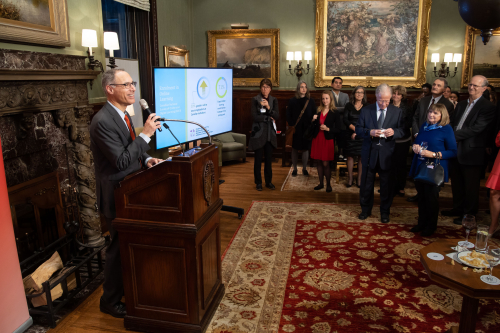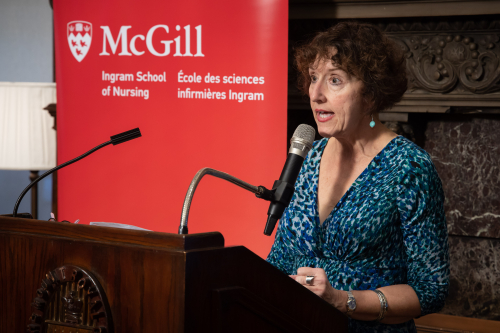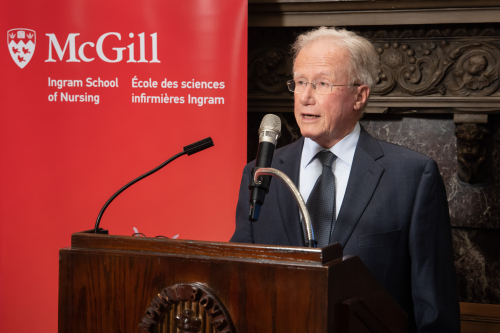It’s a proven way to improve patient safety and outcomes, and meet the evolving health needs of the aging Quebec population. It’s a way to make higher education in nursing available to all communities in the province. It’s a way to increase the pool of potential candidates for graduate-level education to produce the next generation of nurse leaders, researchers and educators, as well as nurse practitioners. It’s a way to ensure more nurses have the required level of training if, and when, Quebec follows all other Canadian provinces and requires a nurse to have a university-level education. It’s a solution that is being developed at McGill University’s Ingram School of Nursing thanks to a generous donation by the Doggone Foundation. The Ingram School of Nursing is creating the province’s first online Bachelor of Nursing program. In addition, it will be bilingual.
“Despite research showing that online instruction can lead to similar or better nursing student outcomes, no Quebec university currently offers online university-level full academic programs in nursing in either language,” explains Dr. Anita Gagnon, Associate Dean, Faculty of Medicine, and Director, Ingram School of Nursing at McGill University. “Developed in partnership with the online learning team at Teaching and Learning Services, the BNI online will provide students with an engaging and rigorous learning experience. This program is specifically tailored to students with a Quebec diploma in nursing (DEC). We’ve been offering our Bachelor of Nursing (Integrated) or BNI program since 2004, but this will be the first opportunity for practicing nurses in Quebec with DECs to improve their knowledge and access higher education in the form of a full degree online. This will make a bachelor’s degree accessible, not only to more nurses here in Montreal, but all over the province, including in remote areas.”
“Our healthcare system is already in desperate need of nurses,” states Chantal Souligny, Director of Nursing at the McGill University Health Centre (MUHC). “Offering this degree online will help nurses remain on the job while they study. In addition,” she continues, “the importance of training the next generation of nurse leaders is clear: encouraging more of our nurses to access a university degree and therefore develop their leadership capabilities is primordial for the optimal functioning of our healthcare system.”
Only 46% of Quebec nurses hold a bachelor’s degree or higher, according to the Ordre des infimières et infirmiers du Québec, the remaining 54% of Quebec nurses holding a DEC. In other Canadian provinces, 63-73% of nurses have a bachelor’s degree or higher. Encouraging more nurses in Quebec to earn a bachelor’s degree offers many advantages, an important one being patient safety: Studies have shown that a 10% increase in bachelor-educated nurses results in a 4-7% decrease in failure-to-rescue/inpatient deaths. A bachelor’s degree is also the path to becoming a nurse leader, researcher, educator and/or a nurse practitioner.
“We are proud to support this educational first in Quebec,” says Paul R. Marchand, BCL’66, LLM’85, President and Executive Director of the Doggone Foundation, which has donated $1 million to the Ingram School of Nursing and to the MUHC Foundation to launch the online program. “When Elspeth McConnell started this foundation, it was in large part to help Montreal achieve and maintain world-class status in scientific and medical excellence. This project to begin the first online Bachelor of Nursing program will do just that,” continues Mr. Marchand. “It will enable nurses all over Quebec, whether anglophone or francophone, to prepare for a healthcare system that requires research skills and innovative thinking to improve patient outcomes. It will allow nurses, many of whom are already in jobs caring for us, to expand their knowledge base, strengthen their critical thinking skills, and prepare to take on expanded roles in the community and in critical care. The program will be a large piece of the puzzle to improve healthcare in Quebec.”
“We are very grateful to the Doggone Foundation and its Executive Director, Paul Marchand, for this generous gift, which comes on the heels of several other generous gifts to McGill University and the MUHC Foundation,” says Dr. David Eidelman, Vice-Principal (Health Affairs) and Dean, Faculty of Medicine, McGill University. “Visionary donors are fundamental to bringing many innovative ideas and programs to life, especially when the need is immediate. This online Bachelor of Nursing program will be the first of its kind in the province and is expected to be profitable within a few short years, but we needed start-up money. Thanks to the Doggone Foundation, we now have that.”
"With gifts like these, the Doggone Foundation demonstrates the power that philanthropy can have in breaking down barriers that exist to improve our educational and healthcare systems," says Julie Quenneville, President of the MUHC Foundation. "The Doggone Foundation has been instrumental in strengthening the MUHC and McGill University through its generous support—helping these institutions maintain their reputations as global leaders in compassionate patient care, education and innovative research."
The Ingram School of Nursing’s online BNI program is currently in development and is expected to launch in September 2021.




Photos: Owen Egan/Joni Dufour
